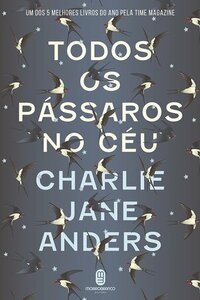Take a photo of a barcode or cover
Great book with great characters! And the writing was so well done! Witches and supercomputers such a unique story!
I think I might have given this a higher rating if I had read it when the world wasn't going to hell. This just made everything worse. :(
After hearing a lot about Charlie Jane Anders' Nebula-winning All the Birds in the Sky, I decided to give it a read, expecting to be pleased. Witches and mad scientists, talking birds and sentient computers, all together in one book? Please. What I did not expect, however, was to find such lovely writing, such tender emotion, and such seamless world building. All the Birds in the Sky surprised me in the best way. So much more than science fiction or fantasy alone, Anders' novel is a smiling, serious, beautiful story about the place of humanity in a world that is more than just human, enabled by a careful drawing upon the best in both genres.
Anders starts her story with something that all too many people can relate to: the two weird kids in a mind-numbingly mediocre school. Unlike their cookie-cutter classmates, Patricia Delfine and Laurence Armstead are special. She is a young witch who can talk to birds, and he is a science geek who built himself a two-second time machine and an intelligent computer. Eventually, their talents draw them in different directions, out of their small confines and into greater possibilities, and the two lose touch. Years later, however, Patricia and Laurence reconnect in San Fransisco, as the world is on the brink of environmental collapse. She is now powerful in magic, and he in science, and their affiliations bring them head-to-head as each embarks on a different path toward saving the world. Is the magic of nature the answer, or the marvel of technology? Their powers and connection will determine the fate of the world, one way or the other.
I have very little negative to say about All the Birds in the Sky. It was a thoroughly delightful read--not just enjoyable in a passive sense, but transporting in a rapturous manner. The book feels like it is trying to be nothing else except entirely itself. Anders' writing is terrific, and her ability to blend the mystical and the mundane contributes to the well-executed magical realism of the book. Her droll sense of humor and comedic timing is also excellent. If I had to make a criticism, it would be that the romantic relationship between Patricia and Laurence was a little weird to me at first. Because I spent the first half of the book getting to know them as kids, it felt slightly intrusive and creepy to read about some of their more intimate moments. Time jumps in the development of their relationship also caused it to seem sometimes forced. But, Anders gave enough explanation, and crafted them to be such complementary characters, that it felt natural after a while. And even so, it is not enough to detract from the value of this book.
Anders' work is refreshing because it explores the intersections of two different but related genres, science fiction and fantasy. These two genres are often close, both on the shelves of bookstores and in the hearts of their fans. However, few works deal so delicately and whimsically with their juxtaposition. Anders' two main characters each come from one of these worlds: Patricia is a protege of magic, and Laurence a whiz at computers. They believe wholeheartedly in the abilities of their disciplines to truly make the world a better place, and it is from this conflict of vision that the tension between them arises. In the end, Anders does not put down one sub-genre at the expense of the other, but rather demonstrates how each has value and danger inherent within it, and that ultimately, the method of saving the world is not sound, no matter what it is, if the people employing it do not have understanding of and compassion for others.
So in the end, All the Birds in the Sky is about more than magic and machines. It is about people, about their place in the world. Anders' novel examines the way people connect to the world naturally, and the alterations they have contrived to that organic connection. And in relating to nature, people are also relating to one another, if all is connected. In accepting the way the world is or in trying to change it, human beings are making value statements about life and about each other. If there is a way that things should or should not be, action is required to bring the world into alignment with that vision; however, a clear imperative is difficult to distinguish, as Patricia and Laurence discover. Where they triumph, however, is in learning harmony and respect, and in not trying to wrest the world too violently in one direction or the other.
All the Birds in the Sky is a good book on multiple levels. It is a fun read, with endearing protagonists and murky villains, which is the best combination. But it is also about more than just the featured events, which is the mark of a great book. It has a timeless quality not just because it is set outside of the actual present, but also because it discusses broader human themes. Magic and supercomputers are (unfortunately) not real, but people with conflicting perspectives on how the world ought to be are very real. By exploring the outlandish, Anders gives insight into the actual.
{See more reviews at my blog, https://witnessofthedawn.wordpress.com}
Anders starts her story with something that all too many people can relate to: the two weird kids in a mind-numbingly mediocre school. Unlike their cookie-cutter classmates, Patricia Delfine and Laurence Armstead are special. She is a young witch who can talk to birds, and he is a science geek who built himself a two-second time machine and an intelligent computer. Eventually, their talents draw them in different directions, out of their small confines and into greater possibilities, and the two lose touch. Years later, however, Patricia and Laurence reconnect in San Fransisco, as the world is on the brink of environmental collapse. She is now powerful in magic, and he in science, and their affiliations bring them head-to-head as each embarks on a different path toward saving the world. Is the magic of nature the answer, or the marvel of technology? Their powers and connection will determine the fate of the world, one way or the other.
I have very little negative to say about All the Birds in the Sky. It was a thoroughly delightful read--not just enjoyable in a passive sense, but transporting in a rapturous manner. The book feels like it is trying to be nothing else except entirely itself. Anders' writing is terrific, and her ability to blend the mystical and the mundane contributes to the well-executed magical realism of the book. Her droll sense of humor and comedic timing is also excellent. If I had to make a criticism, it would be that the romantic relationship between Patricia and Laurence was a little weird to me at first. Because I spent the first half of the book getting to know them as kids, it felt slightly intrusive and creepy to read about some of their more intimate moments. Time jumps in the development of their relationship also caused it to seem sometimes forced. But, Anders gave enough explanation, and crafted them to be such complementary characters, that it felt natural after a while. And even so, it is not enough to detract from the value of this book.
Anders' work is refreshing because it explores the intersections of two different but related genres, science fiction and fantasy. These two genres are often close, both on the shelves of bookstores and in the hearts of their fans. However, few works deal so delicately and whimsically with their juxtaposition. Anders' two main characters each come from one of these worlds: Patricia is a protege of magic, and Laurence a whiz at computers. They believe wholeheartedly in the abilities of their disciplines to truly make the world a better place, and it is from this conflict of vision that the tension between them arises. In the end, Anders does not put down one sub-genre at the expense of the other, but rather demonstrates how each has value and danger inherent within it, and that ultimately, the method of saving the world is not sound, no matter what it is, if the people employing it do not have understanding of and compassion for others.
So in the end, All the Birds in the Sky is about more than magic and machines. It is about people, about their place in the world. Anders' novel examines the way people connect to the world naturally, and the alterations they have contrived to that organic connection. And in relating to nature, people are also relating to one another, if all is connected. In accepting the way the world is or in trying to change it, human beings are making value statements about life and about each other. If there is a way that things should or should not be, action is required to bring the world into alignment with that vision; however, a clear imperative is difficult to distinguish, as Patricia and Laurence discover. Where they triumph, however, is in learning harmony and respect, and in not trying to wrest the world too violently in one direction or the other.
All the Birds in the Sky is a good book on multiple levels. It is a fun read, with endearing protagonists and murky villains, which is the best combination. But it is also about more than just the featured events, which is the mark of a great book. It has a timeless quality not just because it is set outside of the actual present, but also because it discusses broader human themes. Magic and supercomputers are (unfortunately) not real, but people with conflicting perspectives on how the world ought to be are very real. By exploring the outlandish, Anders gives insight into the actual.
{See more reviews at my blog, https://witnessofthedawn.wordpress.com}
I wanted to love this so badly. SO BADLY. I'm always a Stan for talking animals and witches and time travel but this book did not enchant me the way I wanted it to. I really enjoyed when they were smaller but after that I just couldn't keep myself interested.
Se trata de una novela particular tanto en planteamiento como en resolución. Si bien enfrenta de forma directa a la magia y la ciencia encarnados en los dos protagonistas. Les acompañamos desde que son pequeños hasta adultos responsables y de cómo perciben el mundo desde dos puntos de vista que no son tan diferentes aunque algunos se empeñen en que lo sean.
Ambos están muy bien construidos y la autora es hábil consiguiendo que empaticemos con los dos. Les acompañan un elenco de personajes secundarios que, si bien no están muy desarrollados, resultan suficientemente interesantes.
Por desgracia aunque la historia está muy bien hilada y narrada, cuenta con algunas sacadas de manga en algunos puntos que lo desmerecen un poco. Suerte o casualidades lo llaman desde las propia novela que, al haber componente mágico lo trata de justificar, pero que a mí me ha parecido pillado por los pelos.
Y recordad, ¿son los árboles rojos? Pensadlo bien, que en el libro necesitan una respuesta.
Ambos están muy bien construidos y la autora es hábil consiguiendo que empaticemos con los dos. Les acompañan un elenco de personajes secundarios que, si bien no están muy desarrollados, resultan suficientemente interesantes.
Por desgracia aunque la historia está muy bien hilada y narrada, cuenta con algunas sacadas de manga en algunos puntos que lo desmerecen un poco. Suerte o casualidades lo llaman desde las propia novela que, al haber componente mágico lo trata de justificar, pero que a mí me ha parecido pillado por los pelos.
Y recordad, ¿son los árboles rojos? Pensadlo bien, que en el libro necesitan una respuesta.
I gave it 112 pages, and, maybe it's just not for me. The critical acclaim is baffling - Michael Chabon calling it a "masterpiece" on the level of Cloud Atlas? How much did he get paid for that? The premise is intriguing, but the masterfulness stops there. The writing is tepid, the teenage characters - the dialogue, their relationships, their families - are unbelievable. And that's just in the first third of the book. Invest your valued time in Cloud Atlas (or any other David Mitchell book) instead.
I feel weirdly cheated. And confused. What on earth did I just read and why is it so popular?
Actually I'm not totally in the dark as to why All the Birds is so popular. It's got the same hook as Grossman's the Magician's, the same doomed lovers as the Night Circus, the same strange grasp on tech and San Francisco as Mr. Prenumbra's, and, as such, much of my criticism will be similar to my criticism of those works, as will my praise.
So, first the good: it's a simple and easy read with a fast-moving plot. Anders' is very good with a hook and the first two parts of the novel were definitely entertaining. Mostly because it seemed like the slapstick and extreme behaviour of the characters was due to it being viewed through a child's eye ( an assumption that is swiftly corrected in part 3).
I also liked the birds and Patricia's connection to animals. Magic routed in nature is usually quite fun and weird (see Robin Hobb's Soldier Son trilogy for example) but All the Birds stayed pretty surface-level with its magic. Magic, like characters and fundamental plot development, remain surface-level in this book.
I actually started off really enjoying All the Birds. The premise was cliched but fun and seemed to be a satire of modern YA: abused-beyond-belief children surrounded by a sea of unseeing and uncaring peers and adults. Both special, both clumsy, both fated to change the world and eachother . But after 50 pages or so I felt the joke wearing a bit thin, and the characters were still acting so irrationally that it beggared belief. Where was the punchline? Then suddenly the children were adults and the world was black and white, depsite the author making some ham-fisted attempts at trying to convince us otherwise.
Patricia is a graduate of what is basically Brakebills with all of its shallow magical politics, and Larry with all of his savvy know-how escapes impossible circumstances and becomes a tech worker for what seems to be Elon Musk's side project.
Both '''opposing''' sides are fully binary and totally dumb. None of the tech makes sense in the slightest and I found myself getting increasingly irritated at both organisations and the unsubtle Gaia figure.
Part of my frustration with these characters was the extent to which one protagonist kept getting antagonised for the feeblest of reasons.
Patricia, a naive victim of some pretty heavy gaslighting as a kid, gets tricked by someone she thought was a friend and almost a lover into nearly killing everyone. She is, of course, blamed for this, and whilst not extradited like her friend is made to feel the guilt, shame, and brunt of the responsibility for those actions thereafter. And also is likely responsible for the environmental crisis that acclerates global warming. The one that kills her parents. Let me ask you this Anders: W H Y. Why do you hate Patricia so much?
Something else that drove me crazy is that the transition from being 13 years old to adulthood is marked in these characters not by a developed sense of self but broadly by bodily descriptions.
For example:
The awkward child with frizzy hair and grass-stains has pearly-white skin, jet-black hair, and bigger boobs than you would expect. The ugly duckling has blossomed. Gods be praised!
And then old Larry here, who is still stumbling over whether he should save his relationship by dropping a proposal (arrrrrrgh), gets a full head-to-toe-curling description of how, despite being a nerd, he is also somehow an Adonis. What a shocker that the two aren't mutually exclusive, amirite?

The biggest fail though has to come down to the setup from right at the beginning of the book. The grand riddle: is a tree red?
It means shit-all. None of it means anything: the riddle, the tree, her affinity with birds. NOTHING. The tension is setup to have no real conclusion. We don't know if the unravelling, in its downgraded form, has any effect on humankind and the fate of the Earth. We don't know if humanity continues to die everywhere but the West Coast. We don't hear from the Tree or the Birds why she was late, since it didn't seem to matter anyway or why she had to answer the riddle in the first place. None of it matters. The magic is never explained. Their tech. is never explained. Nothing matters.
Look, I'll save you some time. The answer comes down to love.
Yep.
Love.
Oh, and, to a lesser extent, symbiosis with nature and technology. booooo.
1 star for the not-unfun read. -4 for everything else.

Actually I'm not totally in the dark as to why All the Birds is so popular. It's got the same hook as Grossman's the Magician's, the same doomed lovers as the Night Circus, the same strange grasp on tech and San Francisco as Mr. Prenumbra's, and, as such, much of my criticism will be similar to my criticism of those works, as will my praise.
So, first the good: it's a simple and easy read with a fast-moving plot. Anders' is very good with a hook and the first two parts of the novel were definitely entertaining. Mostly because it seemed like the slapstick and extreme behaviour of the characters was due to it being viewed through a child's eye ( an assumption that is swiftly corrected in part 3).
I also liked the birds and Patricia's connection to animals. Magic routed in nature is usually quite fun and weird (see Robin Hobb's Soldier Son trilogy for example) but All the Birds stayed pretty surface-level with its magic. Magic, like characters and fundamental plot development, remain surface-level in this book.
I actually started off really enjoying All the Birds. The premise was cliched but fun and seemed to be a satire of modern YA: abused-beyond-belief children surrounded by a sea of unseeing and uncaring peers and adults. Both special, both clumsy, both fated to change the world and eachother . But after 50 pages or so I felt the joke wearing a bit thin, and the characters were still acting so irrationally that it beggared belief. Where was the punchline? Then suddenly the children were adults and the world was black and white, depsite the author making some ham-fisted attempts at trying to convince us otherwise.
Spoiler
Patricia is a graduate of what is basically Brakebills with all of its shallow magical politics, and Larry with all of his savvy know-how escapes impossible circumstances and becomes a tech worker for what seems to be Elon Musk's side project.
Both '''opposing''' sides are fully binary and totally dumb. None of the tech makes sense in the slightest and I found myself getting increasingly irritated at both organisations and the unsubtle Gaia figure.
Part of my frustration with these characters was the extent to which one protagonist kept getting antagonised for the feeblest of reasons.
Spoiler
Patricia, a naive victim of some pretty heavy gaslighting as a kid, gets tricked by someone she thought was a friend and almost a lover into nearly killing everyone. She is, of course, blamed for this, and whilst not extradited like her friend is made to feel the guilt, shame, and brunt of the responsibility for those actions thereafter. And also is likely responsible for the environmental crisis that acclerates global warming. The one that kills her parents. Let me ask you this Anders: W H Y. Why do you hate Patricia so much?
Something else that drove me crazy is that the transition from being 13 years old to adulthood is marked in these characters not by a developed sense of self but broadly by bodily descriptions.
For example:
"Umm" Patricia said, raising her shoulders so her breasts lifted up inside her white t-shirt.
The awkward child with frizzy hair and grass-stains has pearly-white skin, jet-black hair, and bigger boobs than you would expect. The ugly duckling has blossomed. Gods be praised!
And then old Larry here, who is still stumbling over whether he should save his relationship by dropping a proposal (arrrrrrgh), gets a full head-to-toe-curling description of how, despite being a nerd, he is also somehow an Adonis. What a shocker that the two aren't mutually exclusive, amirite?

The biggest fail though has to come down to the setup from right at the beginning of the book. The grand riddle: is a tree red?
Spoiler
It means shit-all. None of it means anything: the riddle, the tree, her affinity with birds. NOTHING. The tension is setup to have no real conclusion. We don't know if the unravelling, in its downgraded form, has any effect on humankind and the fate of the Earth. We don't know if humanity continues to die everywhere but the West Coast. We don't hear from the Tree or the Birds why she was late, since it didn't seem to matter anyway or why she had to answer the riddle in the first place. None of it matters. The magic is never explained. Their tech. is never explained. Nothing matters.
Look, I'll save you some time. The answer comes down to love.
Yep.
Love.
Oh, and, to a lesser extent, symbiosis with nature and technology. booooo.
1 star for the not-unfun read. -4 for everything else.

This was a fun surprise. The description on the jacket sounded interesting but it sat in my bookcase waiting for an opportune time to read. Then I listened to Anders speak at the National Book Festival and was intrigued by her new book. I purchased that but found "All the Birds in the Sky" waiting to be read first ... so I did.
Just a really fun sci-fi that takes place in a now-ish time period. The main characters are on opposing "sides" in a war to save(?) the planet. Each faction seems more intent on destroying the other faction ... but Patricia and Laurence have been lifelong friends and their relationship complicates their faction's hatred. More than just a "save the world" type book. Also a coming of age story, relationship story, us vs. them story, and more. I really love Anders' writing style and easily get drawn into her world through her descriptions.
Just a really fun sci-fi that takes place in a now-ish time period. The main characters are on opposing "sides" in a war to save(?) the planet. Each faction seems more intent on destroying the other faction ... but Patricia and Laurence have been lifelong friends and their relationship complicates their faction's hatred. More than just a "save the world" type book. Also a coming of age story, relationship story, us vs. them story, and more. I really love Anders' writing style and easily get drawn into her world through her descriptions.
adventurous
medium-paced
Strong character development:
Yes
Flaws of characters a main focus:
Yes
the conflict is disappointingly framed around the USA. the world isn't ending till the USA is threatened and is ending when the enemies of the USA do things it has been doing for decades.




